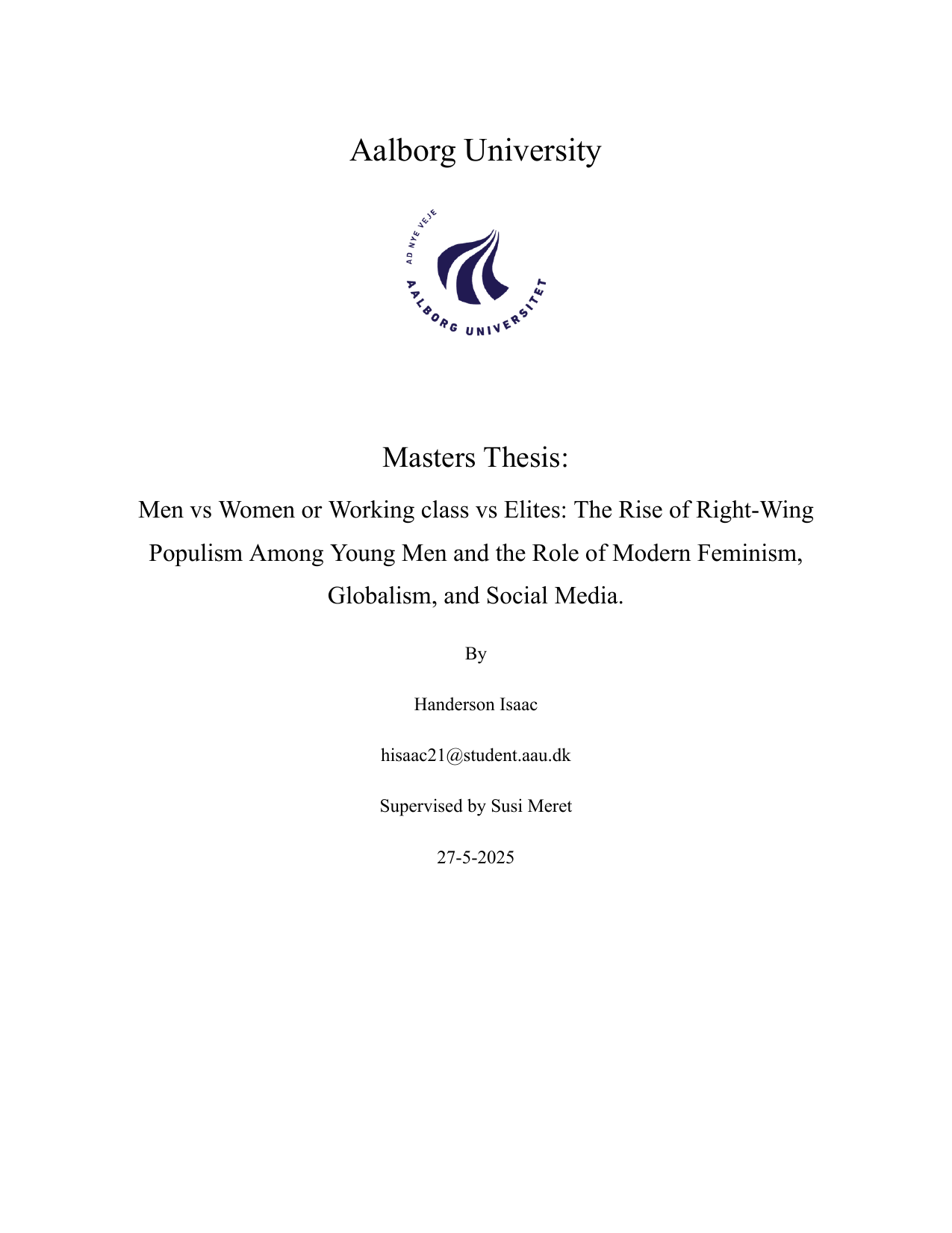
Men vs Women or Working class vs Elites: The Rise of Right-Wing Populism Among Young Men and the Role of Modern Feminism, Globalism, and Social Media.
Author
Term
4. semester
Education
Publication year
2025
Submitted on
2025-05-27
Pages
62
Abstract
This thesis looks into the rising appeal of right-wing populism among young men in Western countries, particularly the United States and Europe, and examines the interrelated roles of modern feminism, globalist policy shifts, and algorithmic social media ecosystems in fueling this realignment. While mainstream discourse often reduces this phenomenon to misogynistic backlash or internet-fueled extremism, this study argues for a deeper, structural interpretation: the turn toward right-wing populism is a response to economic dislocation, cultural alienation, and identity fragmentation experienced by a generation of young men who feel increasingly marginalized by contemporary liberal institutions. Using political theory, gender studies, digital sociology, and quantitative data, this thesis posits that fourth-wave feminism is rooted in egalitarian ideals, has become increasingly corporatized, elite-aligned, and disconnected from working-class realities. By emphasizing symbolic representation over material redistribution, and by promoting moralizing narratives around “toxic masculinity,” modern feminist discourse often alienates the very men who most need structural support. This is compounded by center-left and globalist political parties which, over the past two decades, have prioritized market deregulation, mass immigration, and identity-based inclusion over economic justice. As theorists like Nancy Fraser and Thomas Piketty argue, this has resulted in a “progressive neoliberalism” that fuses cultural liberalism with economic exclusion, leaving many men (white and other ethnicities alike) politically homeless. In addition to that, social media platforms like YouTube, TikTok, and Reddit serve as ideological accelerants. Their algorithms, optimized for engagement rather than accuracy or empathy, often usher young men from innocuous self-improvement content into red pill ideology, anti-feminist rhetoric, and ultimately, right-wing populist politics. Influencers like Andrew Tate, Jordan Peterson, and Fresh & Fit convert male frustration, over dating, status, or identity, into politicized grievance. This radicalization pipeline is subtle but powerful, transforming private heartbreak into collective ideology. Memes, ironic humor, and influencer aesthetics reframe masculinity as resistance against “woke” orthodoxy and liberal condescension. The thesis provides a cross-national perspective, using case studies such as the U.S. populist content ecosystem on TikTok and the strategic success of France’s National Rally among suburban young men. It reveals how populist actors craft emotionally resonant narratives of masculine pride, national sovereignty, and anti-elitism, often targeting men who feel economically disposable and culturally vilified. Empirical analysis of electoral trends shows a marked gender gap among young voters: while young women continue to lean left, men aged 18–29 are increasingly voting for nationalist and populist candidates. The thesis also incorporates polling and engagement data showing how men who feel “disrespected as men” or believe “feminism has gone too far” are statistically more likely to support authoritarian leaders, express distrust in democratic institutions, and engage with red pill content online. Basically, this study argues that the rise of right-wing populism among young men is not merely a cultural reaction, but a systemic response to the erosion of economic security, social cohesion, and male identity. As institutions fail to offer meaningful rites of passage, moral frameworks, or economic pathways, young men seek alternative systems of belonging, often online, often radical, and increasingly political. Understanding this phenomenon is essential for rebuilding a democratic society capable of addressing the emotional, economic, and identity crises facing the next generation of men.
Keywords
Red Pill ; Feminism ; Right Wing ; Populism ; Andrew Tate ; Donald Trump ; Globalism
Documents
